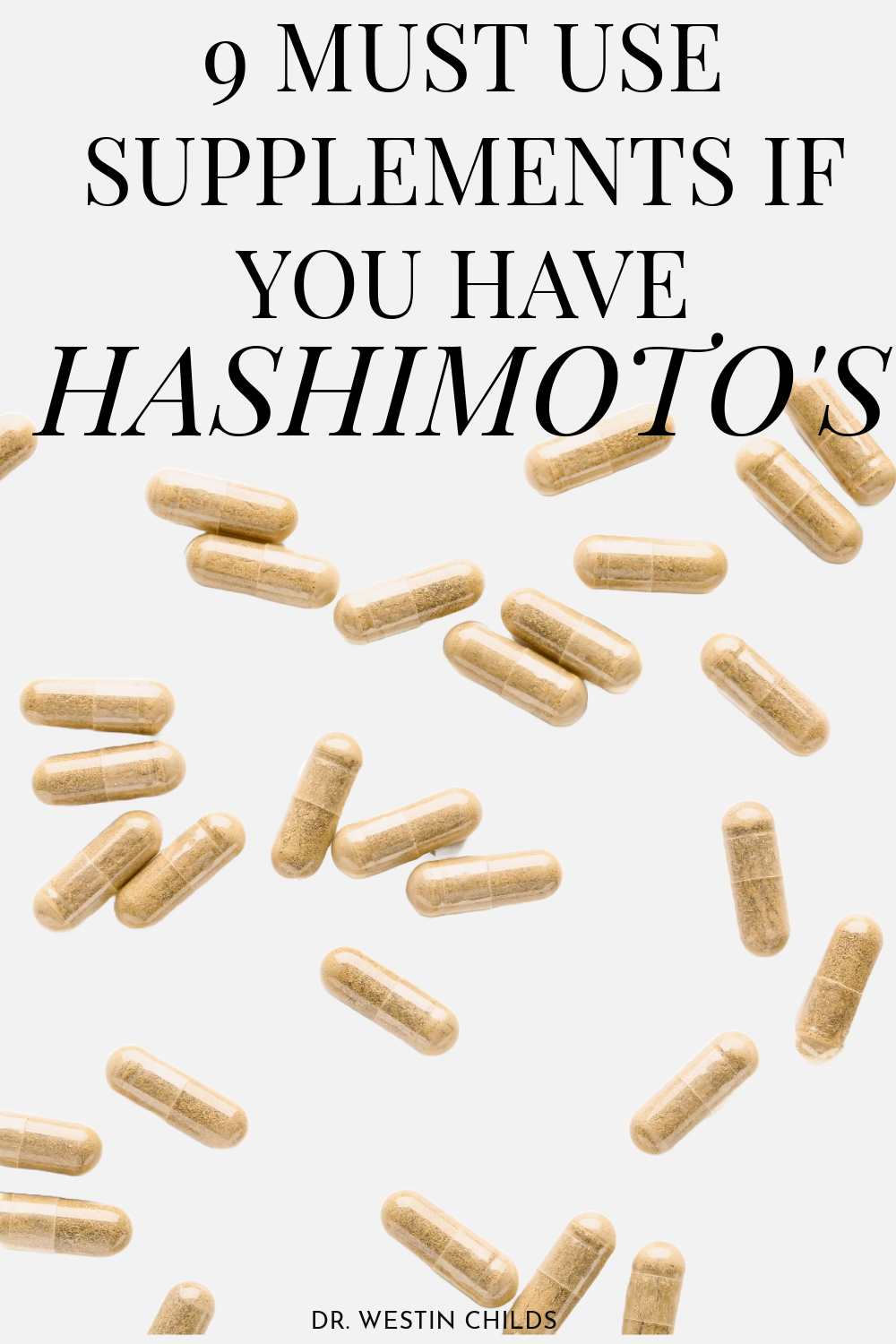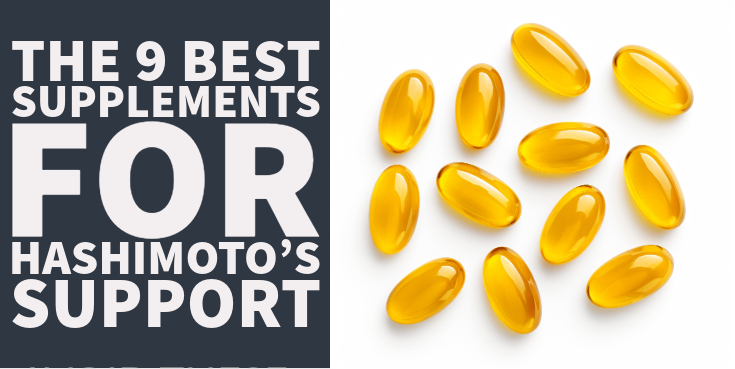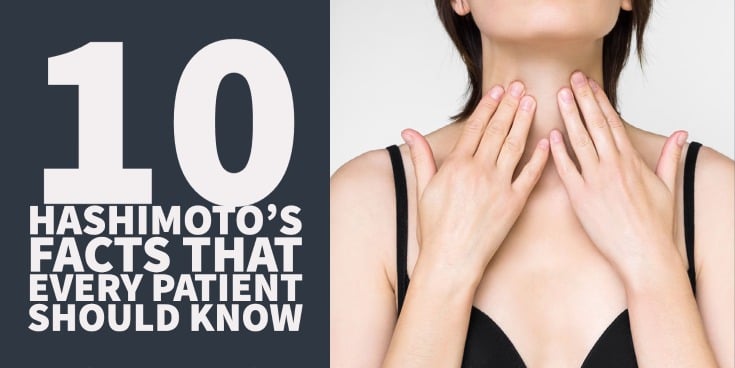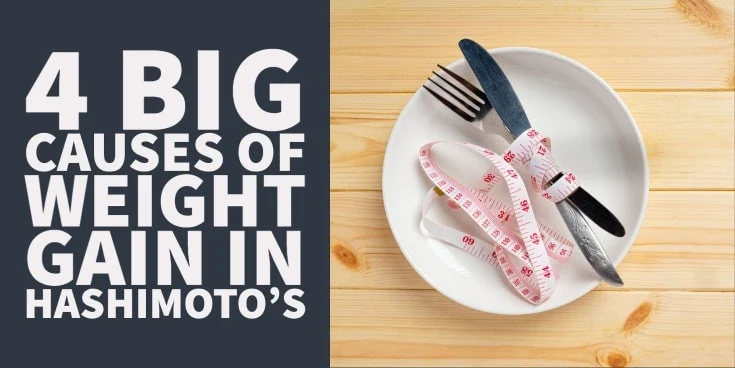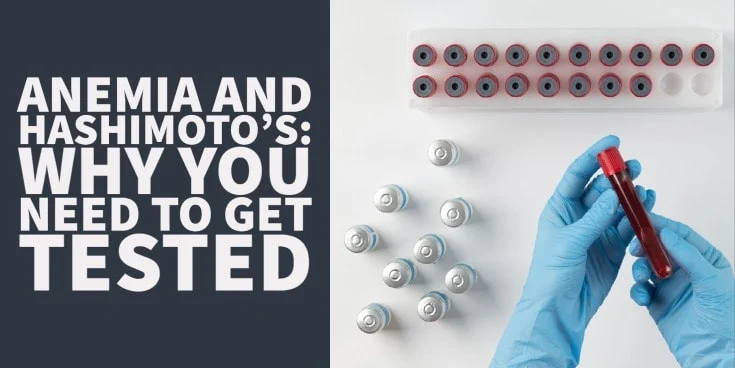As someone with Hashimoto’s, I probably don’t need to tell you how difficult it is to get control over your symptoms.
Whether you’re stuck in the sit-and-wait model or you’re struggling to find your perfect dose of thyroid medication, you have probably asked yourself if there’s a better way.
And the answer to that is a resounding YES.
Natural treatments like supplements offer patients with Hashimoto’s a surefire way to take control of their disease.
I’m not saying that supplements will put your disease into remission (though some patients do report that this occurs), but doesn’t it make sense to at least give them a try given their record of safety and potential to help?
I think so, which is why I want to talk about the most powerful and effective supplements for patients with Hashimoto’s starting right now:
DOWNLOAD FREE RESOURCES
Foods to Avoid if you Have Thyroid Problems:
I’ve found that these 10 foods cause the most problems for thyroid patients. Learn which foods you should avoid if you have thyroid disease of any type.
The Complete List of Thyroid Lab tests:
The list includes optimal ranges, normal ranges, and the complete list of tests you need to diagnose and manage thyroid disease correctly!
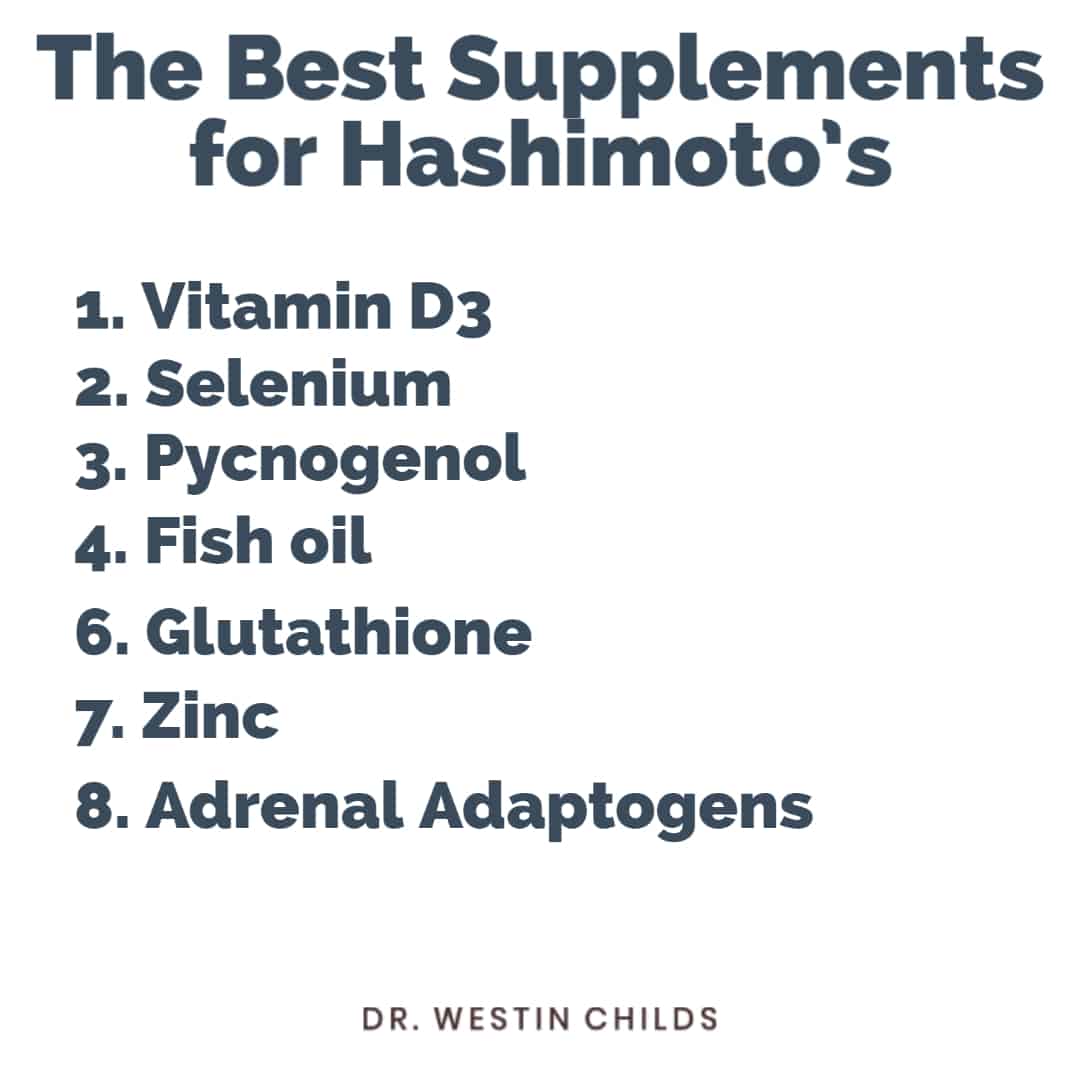
#1. Zinc
Zinc is #1 on this list and the reason is simple:
Not only does it play a role in regulating the immune system, it’s also needed for thyroid function.
When you combine this with the fact that thyroid hormone alters zinc elimination in the kidneys, many patients with Hashimoto’s and hypothyroidism are deficient.
It’s hard to get an exact estimate, but based on several studies (1) it’s probably around 30%.
Supplementing with zinc is a no-brainer for patients with Hashimotos’ for four reasons:
- The first is that zinc is required for the conversion of inactive T4 to active T3. If you don’t have enough zinc you won’t be able to produce the T3 that you need.
- The second is that zinc can help reduce inflammation (2) and may act as an anti-inflammatory agent all by itself.
- The third is that zinc is also required for the proper regulation of your immune system (3). In fact, in the setting of low zinc, your immune system has a hard time fighting off even mild infections.
- And fourth is that zinc is also necessary for hair growth. This doesn’t have to do specifically with Hashimoto’s but it’s an added bonus because many people with Hashimoto’s also have issues with hair loss!
But before you run out and supplement, you need to first consider the various types of zinc available as well as the dose.
Not all formulations of zinc are equally effective because they are not all equally absorbed.
If you have Hashimoto’s you’ll want to house zinc chelate, zinc monomethionine, zinc gluconate, zinc acetate, or zinc citrate.
All of these versions are equally as good, so you can choose whichever form works best for you.
Definitely stay away from zinc oxide, though, which is the cheapest form and inferior to all formulations listed above.
How much Zinc Should you Take for your Thyroid?
Zinc dosing is a little controversial with standard recommendations ranging from 5 mg per day all the way up to 60 mg.
My recommendation is to stay on the lower end of these recommendations for two reasons:
#1. The body can only absorb up to 5-10 mg at any given time.
And #2. Higher doses cause side effects such as nausea, stomach pain, and acid reflux.
As long as you take your zinc on an empty stomach, doses in the 5-15mg range are more than sufficient.

If you are someone who wants more zinc then you need to split up your dose at least 5 hours away from whenever you took your first dose in order to ensure the second dose gets absorbed.
When using zinc for thyroid support, always combine it with selenium.
The reason for this will become obvious when we discuss selenium.
You can get the correct form of zinc with other thyroid-enhancing ingredients here.
#2. Selenium
Selenium is another fantastic mineral to take if you have Hashimoto’s thyroiditis.
Not only does it play a role in protecting your thyroid gland from oxidative stress, it also supports thyroid function directly through its actions on selenoproteins.
These selenoproteins regulate major systems in the body like your thyroid gland, brain, liver, and intestines (4).
If that wasn’t enough, there are also several studies that show that supplementing with selenium may reduce thyroid antibodies (5).
Before you run out and start pounding down selenium, you should know that too much is not a good thing.
It’s much easier than you might think to take more selenium than you need which will only serve to cloud your thyroid management.
You’ll find that some providers recommend doses of selenium as high as 400 to 500 mcg per day, but my recommendation is to stay within the 100 to 200 mcg per day range from all sources (including food).
This prevents accidental toxicity while allowing room in your diet from natural selenium sources which is the preferred way to obtain it.
As far as formulation goes, selenomethionine and selenium glycinate complex work best.
You can get the ideal amount of both selenium and zinc in this supplement.
#3. Adrenal Support
Don’t think you need to support your adrenals? Think again.
I’ve yet to find a patient with Hashimoto’s who didn’t also have problems with stress and, as a result, cortisol.
This is for several reasons:
- The first is that thyroid hormone and cortisol levels appear to be linked (6) such that when one goes down it takes the other with it
- The second is that imbalances in thyroid hormone result in nutrient deficiencies that normally protect against stress
- And the third is that stress negatively impacts thyroid hormone which perpetuates the cycle
The main problem here is that treating your thyroid doesn’t stop the cycle which means supporting your adrenals is critical.
And that’s exactly why I’ve included adrenal support on this list.
Luckily for all of us, we have incredible herbal and botanical ingredients called adaptogens.
These adaptogens help the body adapt to stress and have been shown in numerous studies to positively impact not only cortisol levels but also thyroid hormone levels.
There are tons of adaptogens that can be used, but my favorite for Hashimoto’s include:
- Maca root – In addition to its action as an adaptogen, it also supports libido and sex hormone balance.
- Ashwagandha – In addition to its action as an adaptogen, it also supports recovery and weight management. Contrary to popular belief, ashwagandha is perfectly safe if you have Hashimoto’s which is explained here.
- and Rhodiola – Compared to other adaptogens, I’ve found Rhodiola to be the best for fatigue
These are just my favorites, though, so don’t be afraid to play around with the others if you’ve already tried them.
In addition to adaptogens, you can also consider the use of adrenal glandulars.
Adrenal glandulars are sourced from the actual adrenal glands of cows which provide enzymes, pro-hormones, and other adrenal-supporting building blocks that you can’t get from adaptogens.
Together, adrenal adaptogens and adrenal glandulars make the perfect combo for patients with Hashimoto’s.
#4. Probiotics and Prebiotics
Hashimoto’s is first and foremost a disease of your immune system and, given that 70% of your immune system resides in your gut (7), it makes sense that a functioning gut is pretty important for this group of people.
But this isn’t the only reason you should care about your gut.
It also happens to play a role in regulating thyroid hormone levels by acting as a reservoir for T3.
Whether you’re interested in optimizing your thyroid or optimizing your immune system, your gut health matters.
Many people know they need to support their gut health, they just don’t know how.
This is why taking probiotics and prebiotics is beneficial for just about every case of Hashimoto’s.
While they won’t treat infections like H. pylori (which is very important to identify and treat if you have Hashimoto’s), they do provide general benefits that are too good to be ignored.
Some of these benefits include:
- The crowding out of pathogenic species like yeast and pathogenic bacteria thereby promoting better microbiome diversity (8).
- Supporting the immune system by increasing immunoglobulins.
- Protecting the integrity of your intestinal lining thereby preventing pathogenic bacteria from entering your system.
- Stimulating the growth and repair of your intestinal cells.
For best results, you’ll want to use a combination of probiotics including:
- Soil-based organisms. These species populate the GI tract and provide long-term benefits.
- Lacto and bifido species (9). These species provide short-term benefits but do not populate the GI tract.
- And Saccharomyces boulardii. This beneficial yeast provides immune-supporting properties which makes it ideal for autoimmune diseases.
When choosing a probiotic, look for both a high dose and bacterial diversity.
The CFU per dose will vary depending on which type of probiotic you are using, but, in general, look for one that contains at least 50 billion CFU/serving with at least 10+ different species.
You can see an example of a probiotic designed specifically for patients with thyroid dysfunction here.
#5. Vitamin D3 With Vitamin K2
Pretty much everyone should be aware of their vitamin D level, especially those with Hashimoto’s.
Looking purely at the numbers, about 1 billion people worldwide are deficient.
Research tells us that thyroid patients are more likely to develop vitamin D deficiency for two big reasons:
The first is that the low thyroid state impairs intestinal absorption of vitamin D.
And the second is that the low thyroid state impairs the activation of vitamin D that does make it into your body.
Research is also clear of the impact that vitamin D deficiency has on thyroid health and it isn’t pretty.
Thyroid patients with low levels of vitamin D are at increased risk for:
- Developing thyroid cancer (10)
- Developing Hashimoto’s thyroiditis
- Having abnormal thyroid hormone levels (11)
- And developing Graves’ disease
The good news is that optimizing your vitamin D is a piece of cake.
All you need to do is check your 25, hydroxyvitamin D level when you get your labs drawn next and, if needed, take a vitamin D3 supplement.
The dose you need will depend on your labs, but most people need a dose somewhere around 2,000 IU to 10,000 IU per day.
If you don’t want to wait to get those labs drawn, you can pretty safely take the shotgun approach and just start supplementing with D3 at 5,000 IU/day.
Just realize this is not the ideal way to go about things.
And if you’re going to take vitamin D3, you might as well tack on vitamin K2 as well.
K2 provides benefits such as better calcium shuttling in the body, bone support, and heart support, all of which are beneficial to patients with Hashimoto’s.
You can see an example of a supplement that combines D3 and both active forms of vitamin K2 (MK4 and MK7) here.
It’s worth noting here that vitamin D supplementation, while incredibly beneficial, is a supplement that takes a long time to take effect.
Research shows that many of the benefits are obtained after daily use for 2-3 years!
But given how cheap it is, don’t let this deter you.
#6. Pycnogenol
Next up is something called pycnogenol or pine bark extract.
Pycnogenol is made from the bark of the French maritime pine tree and it’s known for its positive effects on the immune system and inflammation.
We don’t know exactly how it works, but it’s theorized to act as an antioxidant and immunostimulant (12).
Because Hashimoto’s is associated with free radical production in the thyroid gland during the creation of thyroid hormone, pycnogenol may help protect the thyroid gland much in the same way that glutathione does.
It’s been my experience that pycnogenol is particularly effective at helping to reduce thyroid antibodies and it can be combined with other supplements, such as vitamin D, to help support the immune system.
If you are someone who has high levels of TPO antibodies or thyroglobulin antibodies, then you should consider using pycnogenol.
You can kind of think of pycnogenol as an over-the-counter equivalent of LDN (low-dose naltrexone) in terms of how it is used and its benefits.
While vitamin D3 helps to support general immune function, pycnogenol and LDN may help to reduce thyroid antibodies and thyroid gland damage.
While you shouldn’t focus solely on your thyroid antibody levels as a measure of success in your treatment, it’s always ideal to lower them if at all possible.
For best results, look for pycnogenol as “French Maritime Pine Bark Extract” and use a dose between 200 to 400 mg per day.
And for even better results, combine it with LDN, D3, and the supplement we are about to talk about next, black seed oil.
#7. Black Seed Oil Or Nigella Sativa
Very few supplements have the backing of double-blind placebo-controlled trials but the one we are going to talk about next does…
Nigella sativa.
What is nigella sativa?
It’s the plant that produces black seeds and, ultimately, black seed oil.
This oil contains powerful polyphenolic and bioactive compounds in the form of thymoquinone which have powerful effects on the thyroid and immune system.
The double-blind placebo-controlled trial I mentioned above (13) showed that taking 2 grams of nigella sativa for 2 weeks resulted in:
- Decreased body weight as measured by BMI
- Decreased TSH
- Decreased thyroid peroxidase and thyroglobulin antibodies
- Decreased serum VEGF
Most notable is the change in thyroid antibodies that occurred in these patients over the course of 8 weeks.
The 20 patients who took nigella sativa saw a drop in their thyroid peroxidase from a starting level of 294 IU/ml down to 147.99 IU/ml after 8 weeks.
That’s roughly a 50% drop which is absolutely astounding.
Combined with the drop in TSH by 2 whole points, I’d estimate that nigella sativa is roughly the equivalent to around 25 mcg of T4 thyroid hormone.
While you can certainly use nigella sativa powder, I believe that black seed oil provides similar benefits and can be more accurately dosed and titrated.
The biggest downside to this therapy is its flavor.
But given the remarkable benefits, it’s worth tolerating.
You can find my recommended black seed oil supplement here.
#8. Glutathione
It’s theorized that free radical damage to the thyroid gland results in the leakage of proteins into the bloodstream which triggers autoimmune thyroid disease.
Glutathione, acting as the master antioxidant, prevents this process from occurring.
For this reason, glutathione levels in the thyroid gland should be a top priority for all patients with Hashimoto’s.
There are two ways you can get more of it:
- The first is by taking selenium (a nutrient we already discussed!) – Selenium is necessary for your thyroid to produce glutathione (14). If you are selenium deficient then you may not be able to create enough glutathione in your thyroid gland.
- The second is by taking glutathione directly – Glutathione exists in supplement form which you can take by mouth. This allows you an extra way to get glutathione into your body and thyroid gland to reduce thyroid gland inflammation and damage.
Glutathione doses ranging from 250 mg to 1,000 mg per day have been shown to be safe (15) but these high doses may not be required for those with Hashimoto’s.
Even low doses of glutathione, when combined with other nutrients such as selenium, can be effective for improving immune status in those with Hashimoto’s thyroiditis.
Because of its importance, I added glutathione to my multivitamin designed specifically for thyroid patients.
#9. Iodine
I already know what many of you are thinking:
“Isn’t iodine dangerous for people with Hashimoto’s?! He must have no idea what he’s talking about!”.
And while I don’t blame you for thinking this, the reality is that iodine is not only safe for those with Hashimoto’s, it’s also beneficial.
I can easily prove it to you by showing you that you’re taking iodine without realizing it even if you think you’re avoiding it.
Here’s how I know:
- All thyroid medications contain iodine that can be recycled by the body
- Foods like dairy, milk, eggs, and even fruits like bananas and strawberries, contain iodine
- Iodine is found in all sorts of cosmetics and shampoos and is absorbed through the skin
I can pretty much guarantee that you are getting iodine from one or more of these sources and this is a really good thing.
Why?
Because you can’t live without it!
A complete lack of iodine is incompatible with life.
Now, is it true that iodine has the potential to cause problems if you have Hashimoto’s?
Of course! But only if it’s dosed incorrectly.
Studies are clear that the sweet spot for iodine intake is between 100 mcg and 300 mcg per day (16).
Doses below that range result in hypothyroidism and doses above that range increase your risk of autoimmune thyroid disease.
But doses right in the middle are needed and provide a boost to thyroid hormone production.
There’s a lot to unpack here that I can’t go over but if you want a much more detailed overview of the safety of iodine in Hashimoto’s, please see this article.
And if you want to take an iodine supplement that’s dosed in the right range then check this one out.
Your Next Steps
Thinking about taking supplements? Don’t stop there.
Patients with Hashimoto’s often find that other treatments like changing their diet, regular exercise, stress reduction, and getting quality sleep can have a profound impact on how they feel.
And I have resources that can help you with every single one of these things.
If you want to learn more about them, then check out this article next.
Scientific References
#1. https://www.ncbi.nlm.nih.gov/pmc/articles/PMC10837122/
#2. https://www.ncbi.nlm.nih.gov/pmc/articles/PMC4429650/
#3. https://www.ncbi.nlm.nih.gov/pubmed/9701160
#4. https://www.ncbi.nlm.nih.gov/pmc/articles/PMC9138076/
#5. https://www.ncbi.nlm.nih.gov/pubmed/23046013
#6. https://pubmed.ncbi.nlm.nih.gov/38192949/
#7. https://pubmed.ncbi.nlm.nih.gov/33803407/
#8. https://www.ncbi.nlm.nih.gov/pmc/articles/PMC6974441/
#9. https://www.ncbi.nlm.nih.gov/pmc/articles/PMC10884059/
#10. https://www.ncbi.nlm.nih.gov/pmc/articles/PMC5618598/
#11. https://www.ncbi.nlm.nih.gov/pmc/articles/PMC6166548/
#12. https://www.ncbi.nlm.nih.gov/pmc/articles/PMC6619435/
#13. https://pubmed.ncbi.nlm.nih.gov/27852303/
#14. https://www.ncbi.nlm.nih.gov/pmc/articles/PMC4210904/
#15. https://pubmed.ncbi.nlm.nih.gov/24791752/
#16. https://www.ncbi.nlm.nih.gov/pmc/articles/PMC8106604/
